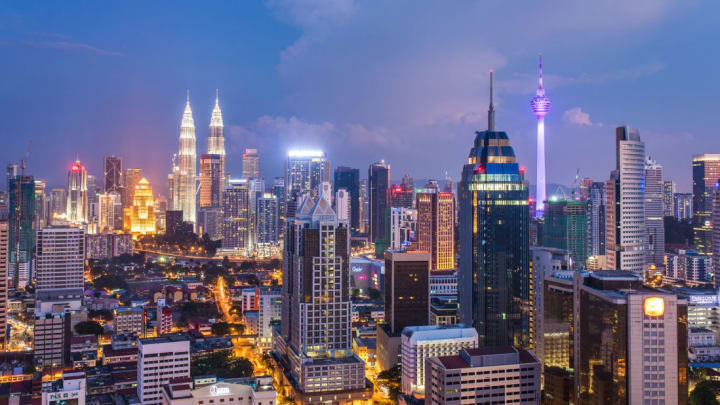For the next 12 months, Zoe Weiner will be living and working remotely in 12 different cities around the world through an organization called Remote Year. As she moves to each new location and tackles new obstacles, she'll share what she learns with us here at Mental Floss. Miss her first installment? Read it here.
On my fifth day in Malaysia, I broke down crying in front of a street meat stand.
I hadn’t slept in a week, couldn’t figure out what any of the “meat ball” skewers were actually made from (and how long they’d been sweating unrefrigerated in the Malaysian heat), and was really, really homesick. Everything from eating to working to finding a moisturizer that wouldn’t bleach my skin just felt so hard. I was exhausted, overwhelmed, and ready to book the next ticket back to New York.
It wasn’t Kuala Lumpur’s fault (although the stifling temperatures, impending rain, and crowded streets weren't helping). The city itself is known to be fairly easy for expats and tourists to navigate, and my fellow remotes and I jokingly called it “Asia Lite” because we knew it was by far the most Westernized city we were going to be living in during our time in Asia. But despite all of the amazing hamburgers and English-speaking taxi drivers, the adjustment still came as a complete shock.
My work hours became completely scattered, and finding any sort of balance (work/life, personal/professional, asleep hours/awake hours) felt insurmountably difficult. It threatened my productivity, and with that, my happiness—hence the sobbing to a stranger trying to sell me satays.
That was my sign I needed to take a serious step back.
In the days and weeks that followed, I reevaluated my work, life, and emotional balance, and came up with a plan to strengthen my productivity without completely burning out. I took to my journal and made a list of exactly why I was here, what I wanted to accomplish, and who I wanted to be a year from now when I was back in the U.S. Then, I asked myself what I needed to succeed and came up with a plan. So far, it’s working. Here are five things you need in order to adjust to working and living in new surroundings, from someone who learned it the hard way.
1. CLEAR GOALS
It’s terrifyingly easy to get distracted when you’re working remotely (thanks, internet), and when you’re traveling it’s 1000 times worse. It’s hard enough to get work done when there’s a new series on Netflix calling your name, let alone when there’s an entire new city outside your door, begging to be explored. Because of this, prioritizing and setting goals is the only way to ensure that anything will ever actually get done. Set yearly, monthly, weekly, and daily goals, and re-visit them regularly to check up on your progress. Here are a few of the ones I’m working toward this year, so the internet can hold me just as accountable as I plan to hold myself:
- Train for the Buenos Aires Marathon in October
- Write one long-form journalistic piece that is published in a print magazine
- Learn to code
- Learn conversational Spanish before I get to South America
2. A STRONG SUPPORT SYSTEM
As lonely as remote work may sometimes feel, there’s no reason you have to go it alone. In order to thrive in an unfamiliar place, you need someone you can call when you feel like you're reaching your breaking point. Even better if you have two people on speed-dial: one who will sympathize with what a hard time you’re having, and another who will tell you to “snap out of it” and take stock of the adventure you're living. Just do yourself a favor and call the sympathizer first.
3. FLEXIBILITY
As incredible as full-time travel may look on Instagram, there’s a less cheery behind-the-scenes reality: Things often go wrong. Food will make you sick, your WiFi will go down, and your phone/wallet/passport is going to get stolen at least once. Not every day is going to be the best, most photogenic day ever, and there are going to be times when you want to just give up and go home. Don’t do it. Learn to embrace the unknown, and learn from the hardest of hard days.
This applies to work, too. When things aren’t going your way, take a deep breath, a step back, and see if there’s another way to attack the problem at hand.
4. ASPECTS OF A ROUTINE
The idea of “wake up, go to the gym, go to work, come home, eat dinner, go to bed” just isn’t realistic when you're in an exciting new setting. Because of this, it’s important to pick out the most important parts of your routine and make them work in your new life. For me, this has meant starting every day with a to-do list, writing in my journal every night, and trying to get to the gym as frequently as possible. Your perception of what it means to have a routine will change, but finding some normalcy will allow you to focus and be productive.
5. A CONTINGENCY PLAN
The reality of working while traveling is a lot harder and less glamorous than most of the “Get Paid to Travel the World” articles make it sound. Jobs fall through, roles change, and the balance of trying to do it all may simply become too difficult to maintain. And this is all okay. Just because things don’t work out exactly the way you expected them to doesn’t mean you’ve failed. But to avoid feeling like everything is crashing down around you each time one little thing goes wrong, come up with some sort of “just in case” plan ahead of time. No matter what—whether you have to quit a job, re-prioritize your goals, or live paycheck to paycheck to make ends meet—it will be ok. I promise.
